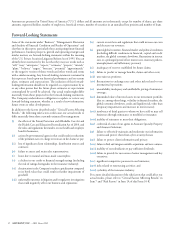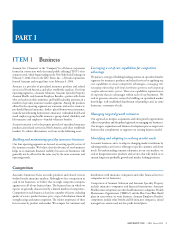Assurant 2011 Annual Report Download - page 20
Download and view the complete annual report
Please find page 20 of the 2011 Assurant annual report below. You can navigate through the pages in the report by either clicking on the pages listed below, or by using the keyword search tool below to find specific information within the annual report.ASSURANT, INC.2011 Form10-K12
PARTI
ITEM 1 Business
Employee Retirement Income Security Act
Because we provide products and services for certain U.S. employee
bene t plans, we are subject to regulation under the Employee Retirement
Income Security Act of 1974, as amended (“ERISA”). ERISA places
certain requirements on how the Company may do business with
employers that maintain employee bene t plans covered by ERISA.
Among other things, regulations under ERISA set standards for certain
notice and disclosure requirements and for claim processing and appeals.
In addition, some of our administrative services and other activities
may also be subject to regulation under ERISA.
HIPAA, HITECH Act and Gramm-Leach-Bliley Act
e Health Insurance Portability and Accountability Act of 1996,
along with its implementing regulations (“HIPAA”), impose various
requirements on health insurers, HMOs, health plans and health care
providers. Among other things, Assurant Health and Assurant Employee
Bene ts are subject to HIPAA regulations requiring certain guaranteed
issuance and renewability of health insurance coverage for individuals
and small groups (generally groups with 50 or fewer employees) and
limitations on exclusions based on pre-existing conditions.
HIPAA also imposes requirements on health insurers, health plans and
health care providers to ensure the privacy and security of protected
health information. ese privacy and security provisions were further
expanded by the privacy provisions contained in the Health Information
Technology for Economic and Clinical Health Act (the “HITECH
Act”), which enhances penalties for violations of HIPAA and requires
regulated entities to provide notice of security breaches of protected
health information to individuals and HHS. In addition, certain of our
activities are subject to the privacy regulations of the Gramm-Leach-
Bliley Act, which, along with regulations adopted thereunder, generally
requires insurers to provide customers with notice regarding how their
non-public personal health and nancial information is used, and to
provide them with the opportunity to “opt out” of certain disclosures.
Dodd-Frank Wall Street Reform and Consumer
Protection Act
In July2010, President Obama signed into law the Dodd-Frank Wall
Street Reform and Consumer Protection Act (the “Dodd-Frank Act”),
which implements comprehensive changes to the regulation of nancial
services in the U.S. Among other things, Congress created the Consumer
Financial Protection Bureau (the “CFPB”). While the CFPB does not have
direct jurisdiction over insurance products, it is possible that regulations
promulgated by the CFPB may extend its authority more broadly to
cover these products and thereby a ect the Company or our clients.
In addition, the Dodd-Frank Act establishes a Federal Insurance O ce
within the Department of the Treasury, headed by a director appointed
by the Secretary of the Treasury. While not having a general supervisory
or regulatory authority over the business of insurance, the director of
this o ce performs various functions with respect to insurance (other
than health insurance) and is required to conduct a study on how to
modernize and improve the system of insurance regulation in the U.S.,
including by increased national uniformity through either a federal
charter or e ective action by the states.
International Regulation
We are subject to regulation and supervision of our international operations
in various jurisdictions. ese regulations, which vary depending on the
jurisdiction, include anti-corruption laws; solvency regulations; various
privacy, insurance, tax, tari and trade laws and regulations; and corporate,
employment, intellectual property and investment laws and regulations.
In addition to the U.S., the Company operates in Canada, the U.K.,
Argentina, Brazil, Puerto Rico, Chile, Germany, Spain, Italy, Mexico
and China, and our operations are supervised by regulatory authorities
of these jurisdictions. For example, our operations in the U.K. are
subject to regulation by the Financial Services Authority (the “FSA”).
Insurers authorized by the FSA are generally permitted to operate
throughout the rest of the European Union, subject to satisfying
certain FSA requirements and, in some cases, meeting additional local
regulatory requirements.
We are also subject to certain U.S. and foreign laws applicable to
businesses generally, including anti-corruption laws. e Foreign Corrupt
Practices Act of 1977 (the “FCPA”) regulates U.S. companies in their
dealings with foreign o cials, prohibiting bribes and similar practices.
In addition, the U.K. Anti-Bribery Act, which became e ective during
2011, has wide jurisdiction over certain activities that a ect the U.K.
Securities and Corporate Governance Regulation
As a company with publicly-traded securities, Assurant is subject to
certain legal and regulatory requirements applicable generally to public
companies, including the rules and regulations of the U.S. Securities
and Exchange Commission (the “SEC”) and the New York Stock
Exchange (the “NYSE”) relating to public reporting and disclosure,
accounting and nancial reporting, and corporate governance matters.
Additionally, Assurant,Inc. is subject to the corporate governance laws
of Delaware, its state of incorporation.
Environmental Regulation
Because we own and operate real property, we are subject to federal, state
and local environmental laws. Potential environmental liabilities and
costs in connection with any required remediation of such properties is
an inherent risk in property ownership and operation. Under the laws
of several states, contamination of a property may give rise to a lien on
the property to secure recovery of the costs of the cleanup, which could
have priority over the lien of an existing mortgage against the property
and thereby impair our ability to foreclose on that property should the
related loan be in default. In addition, under certain circumstances, we
may be liable for the costs of addressing releases or threatened releases of
hazardous substances at properties securing mortgage loans held by us.
























